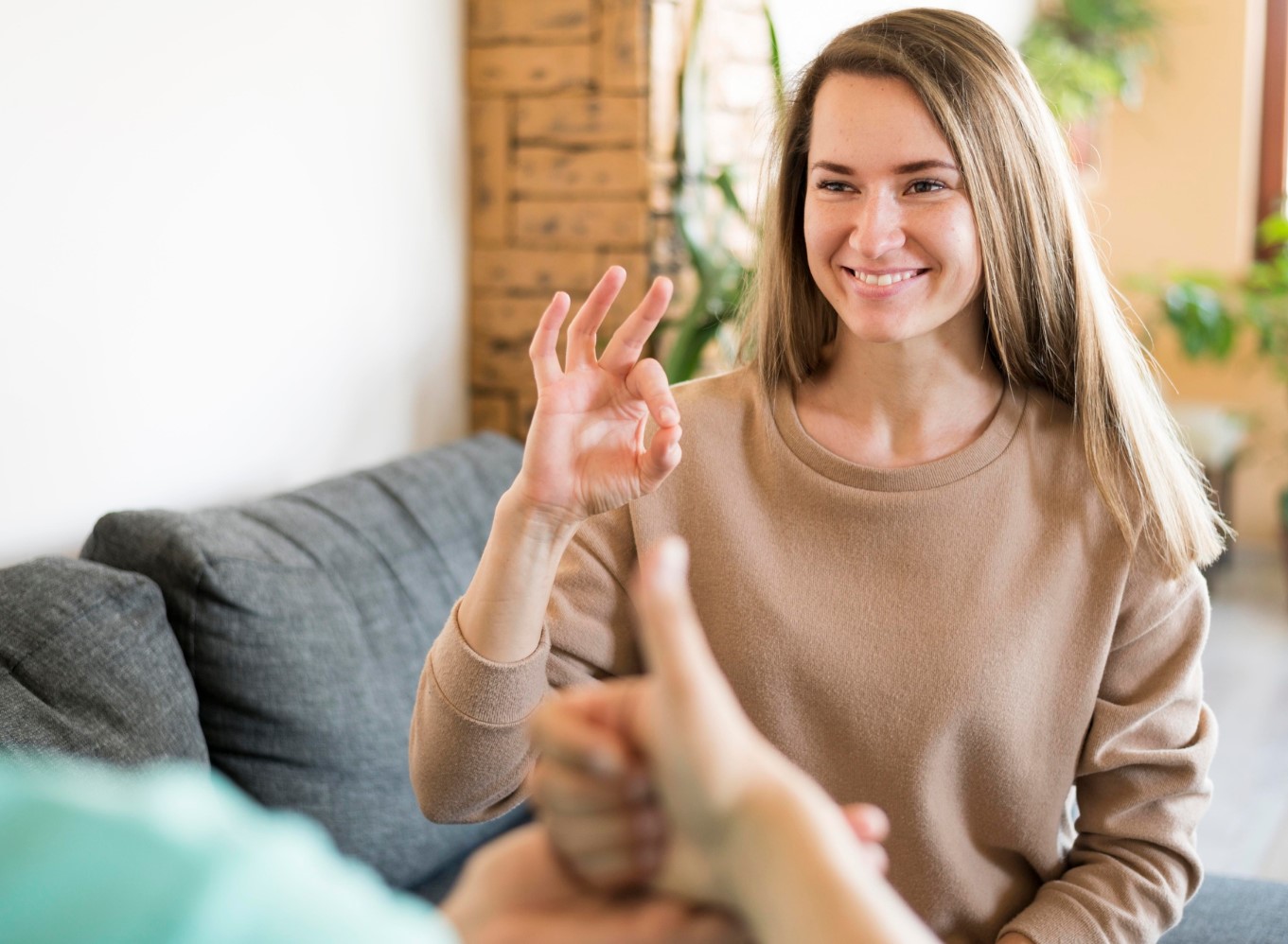
British Sign Language (BSL)
Qualification
British Sign Language is a visual means of communicating using gestures, facial expression and body language with its own vocabulary, grammar and syntax. It is not dependent upon or related to English and is used mainly by people who are deaf or to support those who have a hearing loss. Explore our fully funded BSL qualifications, get to grips with basic words and conversational phrases, and begin your journey into learning a new language today.
Who is the course eligible for?
- Living or working in Cardiff Capital region
- Aged 18+
- Not in full time education
- Available to employed, unemployed and volunteers
Explore the BSL course levels
British Sign Language Level 1 Award
Level 1 Award in British Sign Language is suitable for those who:
• Want to learn basic language skills to communicate simple conversations with Deaf people.
• Want to learn new language skills as part of a programme of study.
• Want to progress to more advanced study and/or employment using BSL in the future.
• Are studying for personal development.
• Are parents, family, friends or colleagues of Deaf people.
Content
Each module below requires attendance at the 21 face-to-face teaching sessions and a total of
10 hours self-study and practice.
Induction: 1-hour virtual meet and greet with your tutor
Module 1: Introduction to BSL
Module 2: Conversational BSL
Module 3: Communicate in BSL about everyday life
Assessment occurs after completion of the training and learners are assessed on the following
objectives:
• Understand and use a limited range of simple words and sentences in BSL.
• Take part in simple, everyday conversations in BSL.
• Give and follow simple directions or instructions in BSL.
• Give and follow simple familiar statements or descriptions in BSL.
By:
• A Practical Demonstration of skills – undertaken by the tutor.
• And holding a Conversation in BSL – undertaken by an external assessor for a maximum of 5 minutes
Delivery
A total of 21 weekly face-to-face sessions of 3 hours each.
British Sign Language Level 2 Certificate
Level 2 Certificate in British Sign Language is suitable for those who:
• Wish to achieve language skills at an intermediate level to improve communication with Deaf people.
• Are Deaf and wish to gain a qualification in their native language.
• Are family, friends and colleagues of Deaf people.
• Want to progress from Level 1 study in BSL, and who may want to progress to more advanced
levels of study in BSL at a later date.
• Are studying for personal development.
Content
There are 3 modules, delivered over 33 sessions of 3 hours face-to-face with an additional 15 hours
of self-study and practice for each module.
The qualification is based on 3 themes: Everyday Conversation, Eating and Drinking, and Spending
and Shopping
Module 1: BSL Receptive Skills
Module 2: BSL Productive Skills
Module 3: BS: Conversational Skills
Assessment
Occurs after completion of the teaching and is made up of:
• A multi-choice exam.
• A presentation of 3-5 minutes and conversation held with an independent assessor.
Delivery
Attendance at 33 weekly face-to-face sessions of 3 hours.
British Sign Language Level 3 Certificate
Essential Requirements
In order to be entered for a course and assessment leading to this qualification, learners must be
able to demonstrate competence in BSL at level 2.
This level is suitable for those:
Working on a regular basis with Deaf people (for example social workers, teachers of the Deaf,
communicators, voluntary workers, workers within Deaf organisations, schools, etc), those who
aspire to work in these contexts, and those who wish to expand their knowledge and skills in
British Sign Language.
Content
One Module made up of the skills required to:
The natural context of using BSL is in two-way interactions (discussions, conversations, debates,
etc.), as well as one-way interactions (monologues, presentations etc.). The candidate is
therefore expected to demonstrate receptive and productive skills in both two-way and oneway interactions. Signature recommends the best approach to teaching and assessing this
qualification is by covering both receptive and productive skills together.
The module is based on 43 weekly sessions of face-to-face teaching with a tutor and an additional
120 hours of self-study and practice.
Delivery
A total of 43 weekly sessions of 3 hours.
Upcoming cohort dates
British Sign Language Level 1
10am-1pm
- 3/2/26
- 5/3/26
- 1/4/26
British Sign Language Level 2
1:30pm-4:30pm
- 23/3/26
- 5/5/26
Download the full course overview
Interested in signing up?
Get in touch to find out how ALS can help you take the next step in your career.
Contact Us